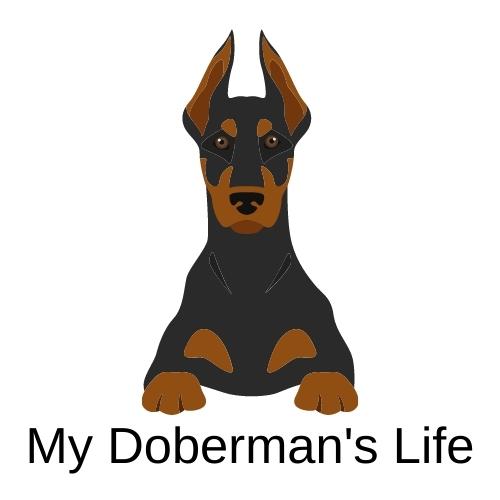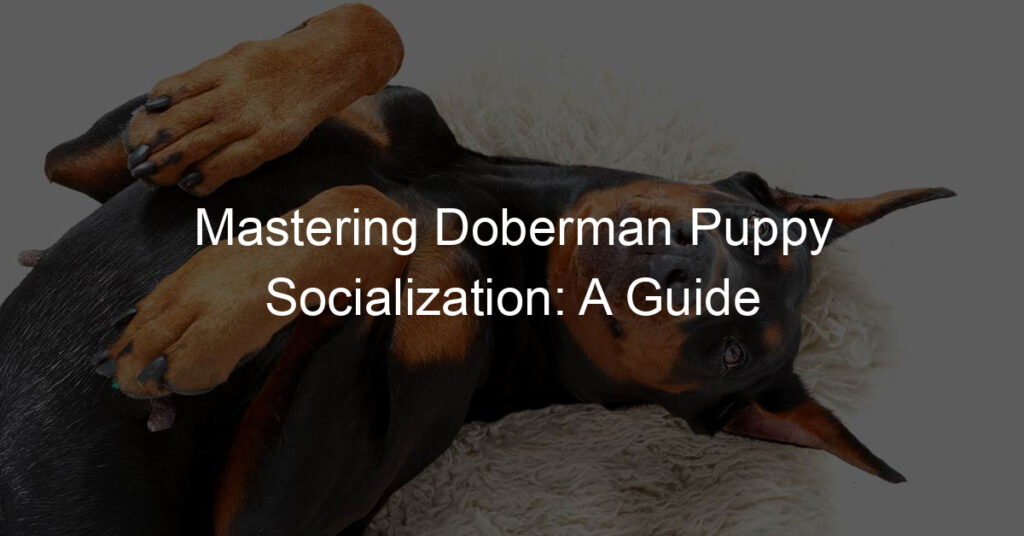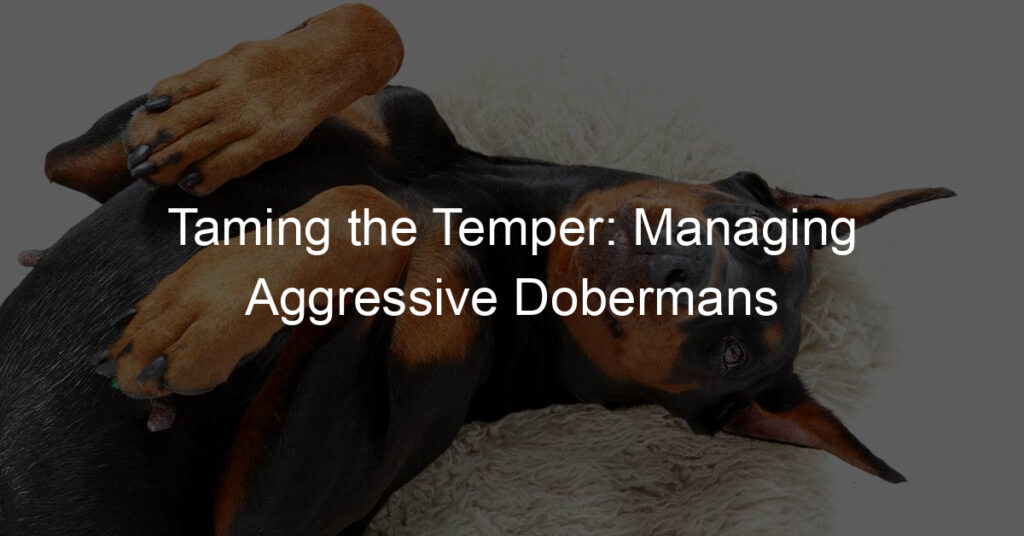
Introduction to Doberman Puppy Socialization
Welcome to our comprehensive guide about Doberman puppy socialization. This crucial stage in your puppy’s life lays the foundation for their future behavior and temperament. Let’s dive in and understand why socialization is so important and the benefits it brings for your Doberman puppy.
-
Understanding the Importance of Socialization
Socialization is the process by which a puppy learns to interact appropriately with other animals, people, and environments. For Doberman puppies, this process is especially important. Dobermans are known for their intelligence and energy, but without proper socialization, these traits can lead to aggressive or fearful behavior.
During the socialization period, which typically occurs between 3 and 12 weeks of age, puppies are most receptive to new experiences. This is the perfect time to expose your Doberman puppy to various situations, sounds, and people. Doing so will help them grow into a confident and well-adjusted adult dog.
-
Benefits of Early Socialization for Doberman Puppies
Early socialization offers numerous benefits for your Doberman puppy. Here are a few key ones:
- Improved Confidence: A well-socialized Doberman puppy is less likely to be fearful in new or unfamiliar situations.
- Better Behavior: Socialization helps reduce potential behavioral issues such as aggression or excessive barking.
- Easier Training: Socialized puppies are generally easier to train as they are more comfortable around people and in different environments.
- Healthier Relationships: A socialized Doberman is more likely to get along well with other pets and people, leading to happier and healthier relationships.
Remember, the earlier you start the socialization process, the better it is for your Doberman puppy’s development. Stay tuned for our next section where we will discuss Doberman puppy behavior and more tips on socialization.
Doberman Puppy Behavior and Socialization
Understanding the behavior of Doberman puppies is crucial to their socialization process. It helps you guide their development and ensure they grow into well-adjusted adult dogs. Let’s delve into the common behaviors of Doberman puppies and how these behaviors influence their socialization.
Understanding Doberman Puppy Behavior
Doberman puppies, like all dogs, have their unique behaviors. Recognizing these behaviors can help you understand your puppy better and aid in their socialization process.
- Common behaviors in Doberman puppies:
- How behavior influences socialization:
Doberman puppies are known for their energy and playfulness. They are curious and love to explore their surroundings. They are also intelligent and quick learners. However, they can sometimes be stubborn and may require consistent training. It’s important to remember that these behaviors are normal and part of their growth and development.
The behavior of a Doberman puppy greatly influences their socialization. For instance, a curious puppy will be more open to meeting new people and animals, which is a key part of socialization. On the other hand, a stubborn puppy may require more patience and consistent training to socialize effectively. Understanding these behaviors can help you tailor your socialization techniques to suit your puppy’s needs.
In conclusion, understanding your Doberman puppy’s behavior is the first step towards effective socialization. By recognizing their common behaviors and understanding how these behaviors influence socialization, you can guide your puppy towards becoming a well-socialized adult dog.
Socializing Your Doberman: Key Techniques
Socializing your Doberman puppy is a crucial part of their development. It helps them become well-adjusted adults. Here are some key techniques you can use:
- Introducing New Environments
- Exposing to Different Sounds and Smells
- Meeting New People and Animals
Exposing your Doberman puppy to different environments is essential. It helps them adapt to various situations and reduces anxiety. Start with familiar places like your home and gradually introduce them to parks, pet stores, and other public places. Remember, each new environment presents a new set of stimuli for your puppy, so it’s important to make these introductions gradual and positive.
Dobermans have a keen sense of hearing and smell. Introducing them to a variety of sounds and smells can help them become more comfortable in different situations. You can start this at home by playing different types of music or sounds of traffic, thunderstorms, etc. Similarly, introduce them to different smells by letting them sniff different objects, foods, and even other animals.
Meeting new people and animals is a vital part of socialization. It helps your Doberman learn how to behave around others. Introduce your puppy to people of different ages, sizes, and ethnicities. Also, let them meet other animals, especially dogs of different breeds and sizes. Always supervise these interactions to ensure they are positive experiences for your puppy.
Remember, socializing your Doberman puppy is not a one-time event but a continuous process. It requires patience and consistency. But the result is a well-behaved, confident, and happy Doberman that is a joy to be around.
Training Doberman Puppies for Socialization
Training a Doberman puppy for socialization is a crucial step in their development. It helps them grow into well-behaved, confident, and friendly dogs. Here are some effective training tips to help you in this journey.
Doberman Puppy Training Tips
Training a Doberman puppy requires a combination of patience, consistency, and positive reinforcement. Here are some key tips to guide you:
- Positive reinforcement techniques: Positive reinforcement is a powerful tool in dog training. Rewarding your Doberman puppy for good behavior encourages them to repeat it. This could be in the form of treats, praises, or petting. Remember, the reward should immediately follow the desired behavior to create a positive association.
- Consistency in training: Consistency is key in any training regimen. Ensure to use the same commands and gestures each time to avoid confusing your puppy. Also, all family members should be on the same page regarding the rules and boundaries for the puppy.
- Patience and understanding: Training takes time and each puppy learns at their own pace. It’s important to be patient and understanding during this process. If a certain technique isn’t working, try to understand why and adjust your approach accordingly.
Remember, the goal of training is not just to teach your Doberman puppy to obey commands, but also to build a strong bond of trust and respect between you and your puppy. This will make the training process more enjoyable and successful for both of you.
Common Training Challenges
Training a Doberman puppy for socialization is not without its challenges. However, understanding these challenges can help you better prepare and overcome them. Here are some common training challenges faced by Doberman owners:
- Overcoming Fear and Anxiety
- Addressing Aggression
- Dealing with Stubbornness
Doberman puppies, like all dogs, can experience fear and anxiety. This could be due to a variety of reasons, such as a new environment, unfamiliar people, or loud noises. It’s important to gradually expose your puppy to different situations, always ensuring they feel safe and secure. Use positive reinforcement techniques, such as treats and praise, to reward your puppy for brave behavior.
Aggression in Dobermans can often be a result of fear or a lack of socialization. It’s crucial to address any signs of aggression early on. Consistent training and socialization with other dogs and people can help mitigate this behavior. Remember, patience and understanding are key when dealing with aggression.
Dobermans are intelligent and strong-willed dogs, which can sometimes lead to stubbornness. Consistency in training is crucial to overcome this challenge. Establish clear rules and stick to them. If your Doberman puppy refuses to follow a command, don’t give in. Instead, remain calm and assertive, reinforcing the command until it is followed.
In conclusion, training a Doberman puppy for socialization can be challenging, but with patience, understanding, and consistency, these challenges can be overcome. Remember, every puppy is unique and may require different approaches to training. The key is to stay patient and persistent, and you will see progress in your Doberman’s behavior and socialization skills.
Raising a Doberman Puppy: Socialization and Care
When it comes to raising a Doberman puppy, there are two key areas to focus on: socialization and care. These are essential for the puppy’s development and overall well-being. Let’s delve into the specifics of Doberman puppy care.
Doberman Puppy Care Essentials
Ensuring your Doberman puppy is well cared for involves a few fundamental aspects. These include proper nutrition, regular exercise, and health check-ups. Let’s explore these in detail:
- Proper nutrition: Just like us, puppies need a balanced diet to grow and stay healthy. For Doberman puppies, a diet rich in protein is crucial. This helps them build strong muscles and maintain a healthy coat. Remember, a well-fed puppy is a happy puppy!
- Regular exercise: Dobermans are known for their energy and athleticism. Regular exercise is vital to keep them fit and mentally stimulated. This could be in the form of daily walks, playtime in the yard, or agility training. Exercise also plays a significant role in their socialization process.
- Health check-ups: Regular vet visits are essential for your puppy’s health. These check-ups help detect any potential health issues early. Your vet can also guide you on the right vaccination schedule and deworming program for your puppy.
In conclusion, raising a Doberman puppy involves a commitment to their socialization and care. By providing them with proper nutrition, regular exercise, and health check-ups, you can ensure your puppy grows into a healthy and well-adjusted adult dog.
Doberman Puppy Interaction and Play
Interacting and playing with your Doberman puppy is an essential part of their socialization and overall well-being. Let’s delve into the importance of this interaction, safe play techniques, and how to introduce toys and games to your furry friend.
- Importance of Play in Socialization
- Safe and Effective Play Techniques
- Introducing Toys and Games
Playtime is more than just fun and games for your Doberman puppy. It’s a crucial part of their socialization process. Through play, puppies learn how to interact with other dogs and humans. They learn to understand and respect boundaries, develop problem-solving skills, and build confidence. According to a study by the American Veterinary Society of Animal Behavior, puppies who engage in regular play are less likely to develop behavioral issues later in life.
When playing with your Doberman puppy, safety should always be your top priority. Avoid rough play or games that encourage aggressive behavior. Instead, opt for activities that stimulate their mind and body in a positive way. Fetch, hide and seek, and agility training are all great options. Always supervise playtime, especially when your puppy is playing with toys or other dogs.
Introducing toys and games to your Doberman puppy can be an exciting time for both of you. Start with soft, chewable toys that are appropriate for their size and age. As your puppy grows, you can introduce more complex toys and games. Puzzle toys, for instance, are excellent for mental stimulation. Remember, the goal is to make playtime fun, engaging, and safe for your puppy.
In conclusion, interaction and play are vital components of your Doberman puppy’s socialization process. By understanding the importance of play, employing safe techniques, and introducing appropriate toys and games, you can ensure your puppy grows into a well-socialized, confident, and happy dog.
Case Studies: Successful Doberman Socialization Techniques
Let’s look at some real-life examples of successful Doberman socialization. These case studies will provide you with practical insights and strategies that have worked for others.
-
Case Study 1: Overcoming fear of strangers
Meet Max, a two-year-old Doberman who was extremely wary of strangers. His owners, the Johnsons, were worried about his aggressive behavior towards unfamiliar faces. They decided to gradually expose Max to strangers in a controlled environment. They invited friends over and asked them to ignore Max initially. Slowly, they encouraged their friends to interact with Max by offering him treats. This technique, known as desensitization, helped Max to associate strangers with positive experiences. Over time, Max’s fear of strangers significantly reduced.
-
Case Study 2: Socializing an aggressive Doberman puppy
Next, we have Bella, a Doberman puppy who showed signs of aggression at a very young age. Bella’s owners, the Smiths, enrolled her in a puppy socialization class. Here, Bella learned to interact with other dogs and humans under the guidance of a professional trainer. The Smiths also used positive reinforcement techniques, rewarding Bella for good behavior. With consistent training, Bella’s aggression was successfully managed, and she became a friendly and well-behaved dog.
-
Case Study 3: Training a stubborn Doberman puppy
Lastly, let’s talk about Rocky, a stubborn Doberman puppy who refused to follow commands. Rocky’s owner, Mr. Davis, decided to use a clicker for training. Every time Rocky followed a command, Mr. Davis would click the device and give Rocky a treat. This method, known as clicker training, helped Rocky understand that following commands led to rewards. Despite his initial stubbornness, Rocky eventually became a well-trained and obedient dog.
These case studies demonstrate that with patience, consistency, and the right techniques, it’s possible to successfully socialize a Doberman. Remember, every dog is unique, and what works for one might not work for another. It’s important to understand your Doberman’s personality and tailor your approach accordingly.
Conclusion: Mastering Doberman Puppy Socialization
In conclusion, socializing your Doberman puppy is a vital part of their upbringing. It helps them develop into well-rounded, confident, and friendly dogs. But remember, it’s not just about introducing them to new experiences, but also about how you handle these experiences. Your reactions and guidance can significantly shape your puppy’s social behavior.
- Key takeaways
- Start socialization early: The earlier you start socializing your Doberman puppy, the better. The first three months are especially crucial.
- Expose them to diverse experiences: Introduce your puppy to different people, animals, environments, and situations. This helps them learn that new experiences are not threatening.
- Positive reinforcement is key: Always reward your puppy for good behavior during socialization. This could be in the form of treats, praise, or petting.
- Patience and consistency: Socialization is not a one-time event. It requires patience and consistency. Keep your sessions short but regular.
- Continued learning and improvement
From our discussion, we can summarize the following key points:
Remember, socialization is a lifelong process. Even after your Doberman puppy has grown, continue to expose them to new experiences. Keep reinforcing positive behavior and correcting any negative behavior. This will ensure that your Doberman remains well-socialized throughout their life.
Moreover, always be open to learning new techniques and strategies for socialization. Stay updated with the latest research and recommendations from animal behaviorists and veterinarians. This will help you provide the best care and training for your Doberman puppy.
Mastering Doberman puppy socialization is a rewarding journey. It not only enhances your bond with your puppy but also contributes to their overall well-being and happiness. So, take the time, make the effort, and enjoy the process. Your Doberman puppy will thank you for it!








